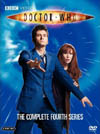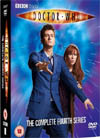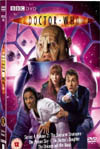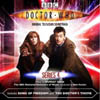DVD Extras (box sets only) include:
Mind you, it isn't a bad idea to be doing a Doctor Who story structured like an Agatha Christie mystery, with the added twist of having the much-loved author in it herself. The biggest problem there might be cramming the large whodunit cast into such a short story, while also cramming in Doctor Who's usual running around & monster chases at the same time. The whodunit mystery has no real space to breathe. The questions barely register with the audience before a big scene pours out all the answers and revelations on top of us. No room for escalations, red herrings, clues and paths that twist towards the truth, then away, then back again. As with "The End of the World" (story no. 162) for "whodunit" reasons, and half-a-dozen other stories this decade for other reasons, the story is simply too short to be powerful or have its true intended impact. Leaving us with questions for a week while waiting for subsequent answers, while we try to figure out the answers ourselves, is a sorely missing opportunity. Ultimately, for those looking for a good Agatha-Christie-style mystery brought into the Doctor Who sci-fi arena, "The Robots of Death" (story no. 90) will probably satisfy more. Or any of the Steven Moffat stories from this decade of Doctor Who.
Writer Gareth Roberts seems to be repeating patterns for historical stories that he previously revealed back in last year's "The Shakespeare Code" (story no. 184), beginning with having the Doctor meet a famous author that Roberts admires, our time traveler gushing a bit too much over them and acting a bit too much like a giddy fan. As before, questions of history being altered are brought up and not really handled very elegantly, while the genesis of some of the author's most famous ideas threatens to become lost in ridiculous loops of time (something echoed once more in Steven Moffat's Season 30 prequel scene "Time Crash"). Of all these repeating patterns, the truly worthy one is that of the adventure at hand attempting to fill in the remaining blanks in the known history of the famous author, which works fairly well in this tale. And I think the loss of the flashback bracket surrounding the story (included as deleted scenes on the DVD) aids the idea of the answers remaining a mystery for later fans of her books. Though a lot of standard, formulaic patterns are on display here, the finished product is a decent episode of television, with much in it to enjoy. Both the writing and the production seem more polished than last year's "The Shakespeare Code", and on the whole I think I like this adventure better. The alien here is still less original and less interesting than the underdeveloped ones in "The Shakespeare Code", although today's alien doesn't beg for greater development the way the others did. Still, historical British murder mysteries are not what I tune in to this show for, particularly if they're too rushed as this one was. In the end, I think this story will barely stay ahead of "Partners in Crime" (story no. 194) to take second-last place in the season rankings. Much better things are in store this season, beginning with the very next episode....
This story has become available on DVD. Click on the Amazon symbol for the location nearest you for pricing and availability:
Note: The full season sets contain commentaries, behind-the-scenes featurettes, and other extras. The smaller volumes only feature the plain episodes. Comments on this article are welcome. You may contact the author from this page:
|









